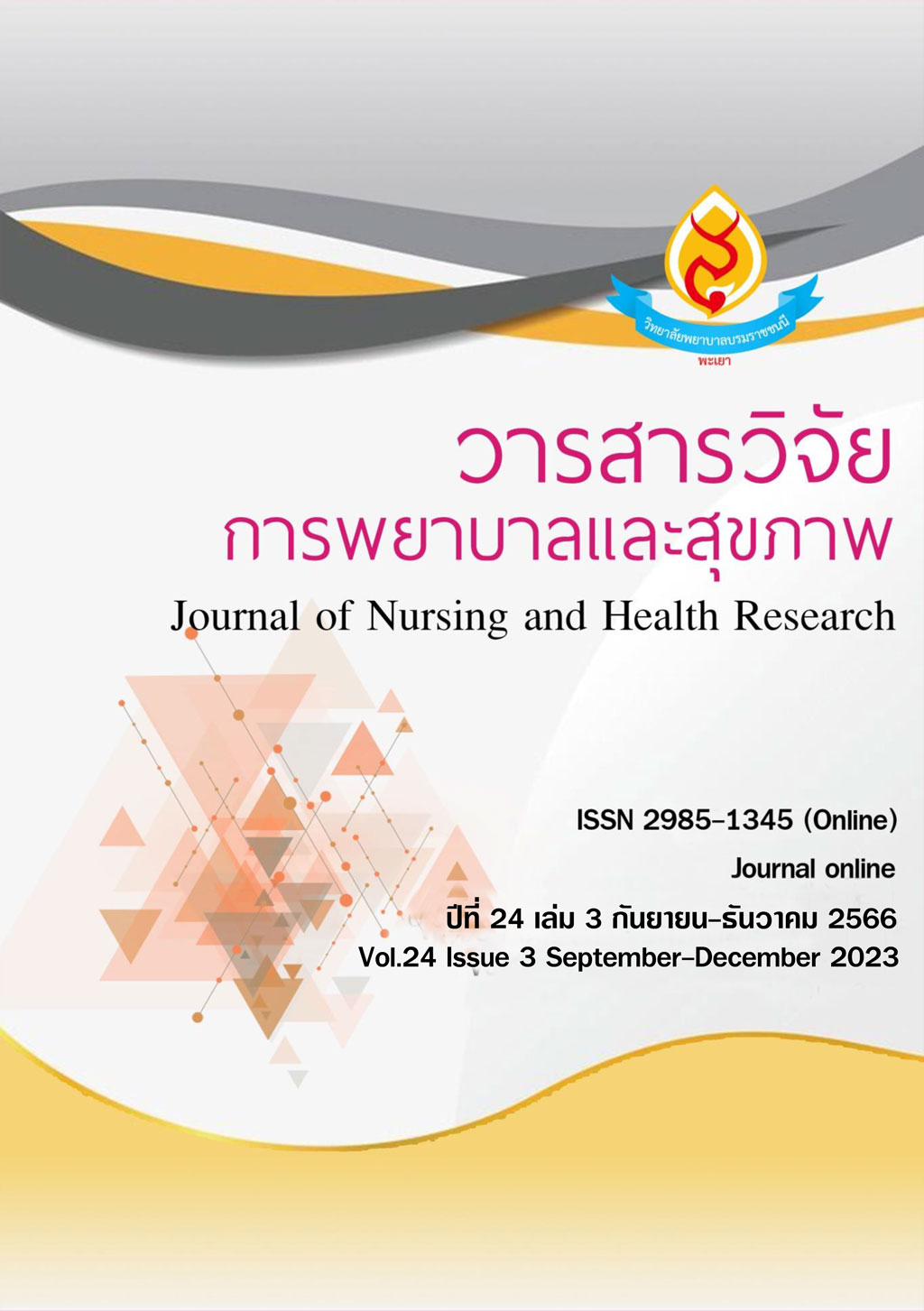การประยุกต์ทฤษฎีการปรับตัวของรอยในการดูแลบุคคลที่เดินทางไปยังพื้นที่สูง
คำสำคัญ:
อาการแพ้พื้นที่สูงเฉียบพลัน, ทฤษฎีการปรับตัวของรอย, การพยาบาลบทคัดย่อ
บุคคลที่เดินทางไปยังพื้นที่สูงตั้งแต่ 2,500 เมตรเหนือระดับน้ำทะเลอาจมีอาการแพ้พื้นที่สูงเฉียบพลันขึ้นได้ ซึ่งอาการดังกล่าวแบ่งออกเป็น 3 ลักษณะที่สำคัญ ได้แก่ การเจ็บป่วยเฉียบพลันเนื่องจากแพ้พื้นที่สูงซึ่งไม่มีอันตรายร้ายแรง ภาวะสมองบวม และภาวะน้ำท่วมปอดเนื่องจากแพ้พื้นที่สูง ซึ่งทำให้ถึงแก่ชีวิตได้ สาเหตุเกิดจากภาวะพร่องออกซิเจนจากความดันบรรยากาศที่ลดลง บทความวิชาการนี้มีวัตถุประสงค์เพื่อนำเสนอหลักการดูแลบุคคลที่เดินทางไปยังพื้นที่สูงตามทฤษฎีการปรับตัวของรอย เพื่อให้บุคลากรทางการแพทย์โดยเฉพาะพยาบาลมีความรู้เกี่ยวกับภาวะดังกล่าว สามารถให้การดูแลบุคคลที่เดินทางไปยังพื้นที่สูงตั้งแต่ก่อนเดินทางไปจนถึงหลังเดินทาง เป็นการป้องกันอาการแพ้พื้นที่สูงเฉียบพลันไม่ให้เกิดความรุนแรงจนถึงขั้นเสียชีวิต ข้อเสนอแนะเพื่อการนำไปใช้ พยาบาลควรประเมินสิ่งเร้าตรง สิ่งเร้าร่วม และสิ่งเร้าแฝง ให้ครอบคลุม รวมทั้งฝึกการใช้แบบประเมิน Lake Louise Acute Mountain Sickness Score จะช่วยคัดกรองและจัดการกับอาการแพ้พื้นที่สูงเฉียบพลันได้อย่างรวดเร็ว
เอกสารอ้างอิง
ชัยชนะ จันทรคิด. (2560). ภาวะ High altitude pulmonary edema (HAPE) ในโรงพยาบาลพุทธโสธร: รายงานผู้ป่วยหายากในประเทศไทย. วารสารโรงพยาบาลพุทธโสธร, 33(3-4), 127-130.
วัชรพงศ์ ปิยะภาณี. (2561). เวชศาสตร์การเดินทางและท่องเที่ยว (พิมพ์ครั้งที่1). กรุงเทพฯ: คณะเวชศาสตร์เขตร้อน มหาวิทยาลัยมหิดล.
Aman, M. & Bashir, J. (2019). Roy’s adaptation model of nursing. International Journal of Scientific Development and Research, 4(1), 283-287.
André, M., Brucato, N., Plutniak, S., Kariwiga, J., Muke, J., Morez, A., ... Ricaut, F.X. (2021). Phenotypic differences between highlanders and lowlanders in Papua New Guinea. Plos One, 16(7), 1-19.
Berger, M., Schiefer, M., Treff, G., Sareban, M., Swenson, R., & Bärtsch, P. (2020). Acute high-altitude illness: updated principles of pathophysiology, prevention, and treatment. German Journal of Sports Medicine, 71, 267-274.
Falla, M., Giardini, G., & Angelini, C., (2021). Recommendations for traveling to altitude with neurological disorders. Journal of Central Nervous System Disease, 13, 1-18.
Gallagher, S. A., Hackett, P., & Rosen, J. M. (2022). High altitude illness: Physiology, risk factors, and general prevention. Retrieved from https://www.uptodate.com/contents/high-altitude-illness-physiology-risk-factors-and-general-prevention
Headache Classification Committee of the International Headache Society. (2018). The International Classification of Headache Disorders (3rd ed.) (ICHD-3). Retrieved from https://ihs-headache.org/wp-content/uploads/2020/05/ICHD-3-Pocketversion.pdf
Hüfner, K., Brugger, H., Kuster, E., Dünsser, F., Stawinoga, A., Turner, R., ... Unterweger, B.S. (2018). Isolated psychosis during exposure to very high and extreme altitude – characterization of a new medical entity. Psychological Medicine, 48(11), 1872-1879.
Hyperbaric technologies inc. (2011). Training and reference manual, The first portable hyperbaric chamber for the treatment of acute mountain sickness. Retrieved from https://amga.com/wp- content/uploads/2013/09/Gamow-bag-specs.pdf
Kumar, D., Rath, T. K., & Verma, L. C. (2018). Occurrence of high altitude cerebral edema (hace) and high altitude pulmonary edema (HAPO) simultaneously at 12000 ft: a rare phenomen. Journal of Advances in Medicine, 5(4), 1075-1077. doi: 10.18203/2349-3933.ijam20183151
Luks, A. M., Auerbach, P. S., Freer, L., Grissom, C. K., Keyes, L. E., McIntosh, S., ... Hackett, P. H. (2019). Wilderness medical society clinical practice guidelines for the prevention and treatment of acute altitude illness: 2019 update. Wilderness & Environmental Medicine, 30(4), S3–S18. doi: 10.1016/j.wem.2019.04.006
Madan, A. (2017). Correlation between the levels of SpO2and PaO2. Lung India, 34(3), 307-308. doi: 10.4103/lungindia.lungindia_106_17
Massachusetts Institute of Technology. (2023). Fact sheet: altitude sickness. Retrieved from https://ehs.mit.edu/wp-content/uploads/EHS-0174.pdf
Palubiski, L. M, O’Halloran, K. D., & O’Neill, J. (2020). Renal physiological adaptation to high altitude: a systematic review. Frontiers in Physiology, 11, 1-17. doi: 10.3389/fphys.2020.00756
Pandey, P., Lee, K., Amatya, B., Angelo, K. M., Shlim, D. R., & Murphy, H. (2021). Health problems in travellers to Nepal visiting CIWEC clinic in Kathmandu - A GeoSentinel analysis. Travel Medicine and Infectious Disease, 40, 101999. doi: 10.1016/j.tmaid.2021.101999
Parati, G., Agostoni, P., Basnyat, B., Bilo, G., Brugger, H., Coca, A., ... Torlasco, C. (2018). Clinical recommendations for high altitude exposure of individuals with pre-existing cardiovascular conditions. European Heart Journal, 39(17), 1546–1554. doi: 10.1093/eurheartj/ehx720
Peter, H. & Shlim, D. (2019). High Elevation Travel & Altitude Illness. In Nemhauser, J. D. (Eds.), CDC Yellow Book 2024: Health Information for International Travel. USA: U.S. Department of Health and Human Services. Retrieved from https://wwwnc.cdc.gov/travel/yellowbook/2020/noninfectious-health-risks/high-altitude-travel-and-altitude-illness
Roach, R. C., Hackett, P. H., Oelz, O., Bärtsch, P., Luks, A. M., MacInnis, M. J., … Baillie, J. K. (2018). The 2018 Lake Louise Acute Mountain Sickness score. High Altitude Medicine & Biology, 19(1), 4–6. doi: 10.1089/ham.2017.0164
Ruffini, R., & Cera, N. (2020). Mental fatigue and emotional states following high altitude hypoxia exposure. Journal of Psychopathology, 26(3), 218-224.
Savioli, G., Ceresa, I., Gori, G., Fumoso, F., Gri, N., Floris, V., ... Zanza, C., (2022). Pathophysiology and therapy of high-altitude sickness: practical approach in emergency and critical care. Journal of Clinical Medicine, 11(14), 1-18.
Schmickl, C., Owens, R., Orr, J., Edwards, B., & Malhotra, A. (2020). Side effects of acetazolamide: a systematic review and meta- analysis assessing overall risk and dose dependence. BMJ Open Respiratory Research, 7(1), 1-13.
Tarry, D., & Powell, M. (2017). Hypoxic vasoconstriction. BJA Education. 17(6), 208-13.
The National Travel Health Network and Centre: [NaTHNaC]. (2023). Altitude illness. Retrieved from https://travelhealthpro.org.uk/disease/12/altitude-illness
Tymko, M., Willie, C., Howe, C., Hoiland, R., Stone, R., Tymko, K., ... Ainslie, P. (2022). Acid-base balance at high altitude in lowlanders and indigenous highlander. Journal of Applied Physiology, 132(2), 575-80.
Woods, P., & Alcock, J. (2021). High-altitude pulmonary edema. Evolution, Medicine & Public Health, 9(1), 118–119. doi: 10.1093/emph/eoaa052
ดาวน์โหลด
เผยแพร่แล้ว
รูปแบบการอ้างอิง
ฉบับ
ประเภทบทความ
สัญญาอนุญาต
ลิขสิทธิ์ (c) 2023 วารสารวิจัยการพยาบาลและสุขภาพ

อนุญาตภายใต้เงื่อนไข Creative Commons Attribution-NonCommercial-NoDerivatives 4.0 International License.



